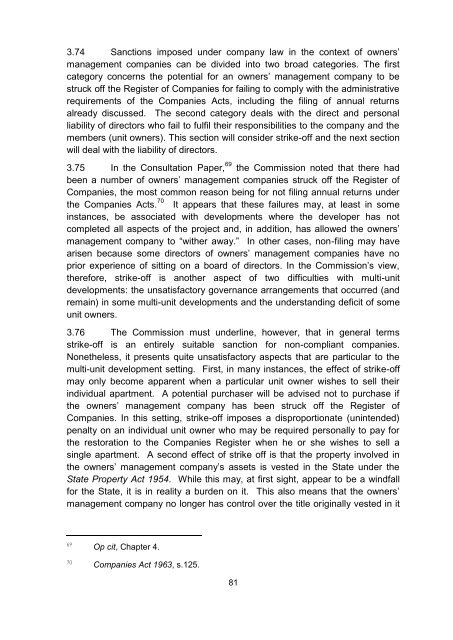Report on Multi-Unit Developments - Law Reform Commission
Report on Multi-Unit Developments - Law Reform Commission
Report on Multi-Unit Developments - Law Reform Commission
You also want an ePaper? Increase the reach of your titles
YUMPU automatically turns print PDFs into web optimized ePapers that Google loves.
3.74 Sancti<strong>on</strong>s imposed under company law in the c<strong>on</strong>text of owners‘<br />
management companies can be divided into two broad categories. The first<br />
category c<strong>on</strong>cerns the potential for an owners‘ management company to be<br />
struck off the Register of Companies for failing to comply with the administrative<br />
requirements of the Companies Acts, including the filing of annual returns<br />
already discussed. The sec<strong>on</strong>d category deals with the direct and pers<strong>on</strong>al<br />
liability of directors who fail to fulfil their resp<strong>on</strong>sibilities to the company and the<br />
members (unit owners). This secti<strong>on</strong> will c<strong>on</strong>sider strike-off and the next secti<strong>on</strong><br />
will deal with the liability of directors.<br />
3.75 In the C<strong>on</strong>sultati<strong>on</strong> Paper, 69 the Commissi<strong>on</strong> noted that there had<br />
been a number of owners‘ management companies struck off the Register of<br />
Companies, the most comm<strong>on</strong> reas<strong>on</strong> being for not filing annual returns under<br />
the Companies Acts. 70 It appears that these failures may, at least in some<br />
instances, be associated with developments where the developer has not<br />
completed all aspects of the project and, in additi<strong>on</strong>, has allowed the owners‘<br />
management company to ―wither away.‖ In other cases, n<strong>on</strong>-filing may have<br />
arisen because some directors of owners‘ management companies have no<br />
prior experience of sitting <strong>on</strong> a board of directors. In the Commissi<strong>on</strong>‘s view,<br />
therefore, strike-off is another aspect of two difficulties with multi-unit<br />
developments: the unsatisfactory governance arrangements that occurred (and<br />
remain) in some multi-unit developments and the understanding deficit of some<br />
unit owners.<br />
3.76 The Commissi<strong>on</strong> must underline, however, that in general terms<br />
strike-off is an entirely suitable sancti<strong>on</strong> for n<strong>on</strong>-compliant companies.<br />
N<strong>on</strong>etheless, it presents quite unsatisfactory aspects that are particular to the<br />
multi-unit development setting. First, in many instances, the effect of strike-off<br />
may <strong>on</strong>ly become apparent when a particular unit owner wishes to sell their<br />
individual apartment. A potential purchaser will be advised not to purchase if<br />
the owners‘ management company has been struck off the Register of<br />
Companies. In this setting, strike-off imposes a disproporti<strong>on</strong>ate (unintended)<br />
penalty <strong>on</strong> an individual unit owner who may be required pers<strong>on</strong>ally to pay for<br />
the restorati<strong>on</strong> to the Companies Register when he or she wishes to sell a<br />
single apartment. A sec<strong>on</strong>d effect of strike off is that the property involved in<br />
the owners‘ management company‘s assets is vested in the State under the<br />
State Property Act 1954. While this may, at first sight, appear to be a windfall<br />
for the State, it is in reality a burden <strong>on</strong> it. This also means that the owners‘<br />
management company no l<strong>on</strong>ger has c<strong>on</strong>trol over the title originally vested in it<br />
69<br />
Op cit, Chapter 4.<br />
70<br />
Companies Act 1963, s.125.<br />
81

















